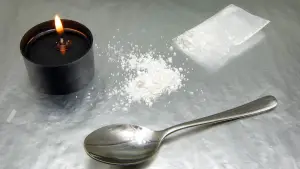“He was screaming obscenities when we arrived at the accident and emergency unit of the hospital that fateful evening. His eyes stared wildly at everyone, filled with suspicion. His shirt was off, lying carelessly on the floor beside the bed. Quite young, I suspected he was around 17, (later found out he was 15 years old). The attendants on call were doing their best to restrain him but he was fighting back, yelling at his poor parents who were pleading with him to remain calm. His elder sister stood some distance away from the scene, sobbing uncontrollably.
We were summoned to review a psychiatric case, and there was no doubt that this was the one. We got a drug and administered it to calm him down while my superiors filled out the form to transfer him to the Mental Health and Behavioral Medicine department of the hospital. I sat down with the parents to take the emergency history – it was a case of substance abuse, another one, my third case for that week. By the time the week ended, we had seen five cases. That was the lowest number I saw per week throughout my six weeks rotation in Psychiatry, it was disturbing, to say the least.”

Drug abuse refers to the excessive and addictive use of drugs for nonmedical purposes, usually for the psychoactive or intoxicating effects, despite the problems that can arise from such use. A lot of drugs are currently abused; alcohol, tobacco, benzodiazepines, opioids, and cocaine; the list is endless. It is a huge public health concern, and despite efforts made over the years by the relevant agencies to curb the menace, it persists. Research shows that over 14.3 million individuals abuse drugs in Nigeria. Of these, over 3 million of them have disorders that arose from abuse. A lot of people, most especially our youths (males and females), still do drugs, and if nothing changes, a lot more will too.
Some reasons why our youths indulge in illicit drugs include; curiosity, experimentation, pressure from peers, and a means of coping with stress. There is a certain type of ‘high/euphoria/calmness’ individuals get from using these substances (the dopamine rush around the pleasure centers of the brain is increased), a ‘high’ they will keep chasing until they get help or worse, they can’t chase any longer.
If left unabated, the effects of drug abuse are horrible and far-reaching; for the individual, the family, and the society.
Some of the Effects of Drug Abuse Include;
•Psychological:
Psychoactive dependence and addiction are common occurrences among drug abusers. Given time, their mental state can deteriorate, resulting in psychosis, delusions, manic episodes, depression, and even suicide.
•Social:
The effects of drug abuse on the social life of these individuals are also worth noting, the immediate family and society suffer considerably. Destroyed lives, homes, friendships, and other forms of relationships. Social withdrawal and alienation are common, and so are issues of rape, stealing, armed robbery, drunk driving, disorderly conduct in public spaces, fraud, and criminal tendencies among users. No one is left out, no place is safe.
•Education:
The impact on our Educational system is also considered in this article. Drug abusers find it difficult to thrive in academic work; the drugs cause memory loss, and lack of concentration, as a result, the majority can’t cope and eventually drop out. That young boy stayed over a month in the psychiatric ward, this was during a school session. Some stay longer in hospitals and rehab centers, miss classes, and exams, and eventually abandon their education.
At a time when most of our brightest minds are leaving the country in droves, the implication of this is dire.
•General well-being:
Besides the effect of these psychoactive drugs on the mental state of abusers, the negative impact on their overall health is also enormous. Most abusers are malnourished, unkept, and exposed to sexually transmitted infections (including HIV/AIDS) especially because of the loss of inhibitions and increased risky behaviors that occur under the influence.
•Economic:
The financial burden of drug abuse on individuals, families, businesses, and the Government is massive. Youths (who constitute a great percentage of our workforce) waste away in search of and peddling these drugs. Economically, they contribute little, and when they seek help, the money spent on treatment, rehabilitation, and support leaves a dent in the economy. Most of these patients have to be on drugs for years, and sometimes, for life, these drugs are not cheap.
I still feel shivers down my spine whenever I remember my time in psychiatry. Young, vibrant youths, our future, wasting away because of transient pleasures. The tears shed by family members in hospital hallways, the sleepless nights, the apprehension, it has to end. Although a lot is being done by the relevant agencies to curb this menace, a lot more can be done, for our good, and the good of the nation. Like a pandemic, no one is safe until the virus that is drug abuse is completely gone.







